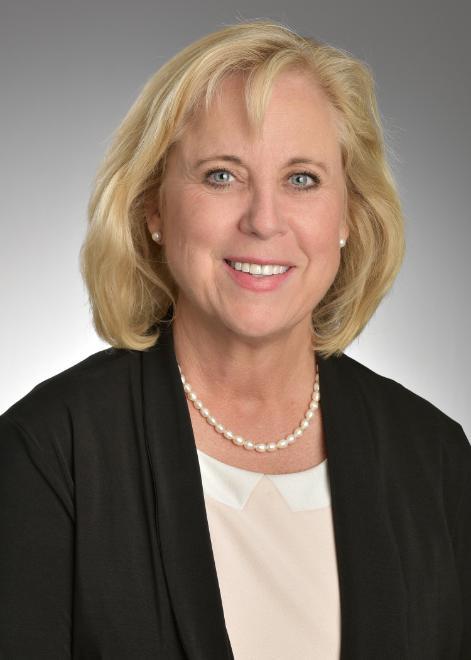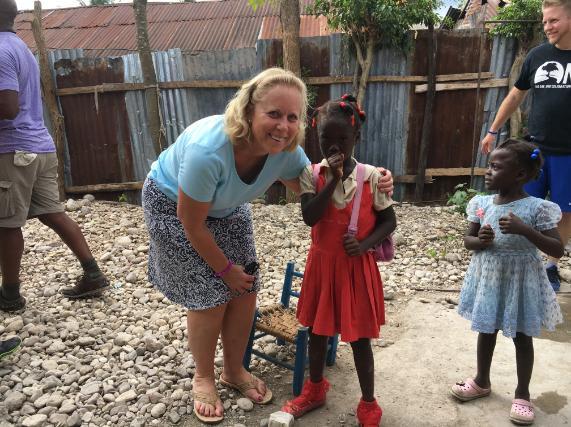Removing barriers to care at home and abroad in Haiti
Since graduating from the MHA program in 1984, Terrie Edwards has held leadership posts across various Virginia healthcare organizations. She began her leadership healthcare career with HCA Virginia (Henrico Doctors’ Hospital) and has experience in several non-profit health systems (Centra and Bon Secours), as well as independent hospitals. She planned and opened Bon Secours St. Francis Medical Center in Richmond, and has medical practice background as administrator for a large cardiothoracic surgery specialty group.
 For the past 13 years, she has been a leader at Sentara in Hampton Roads, first as the president of Sentara Leigh Hospital, then as the president of the Peninsula region, to her current role as president of the Southside (VA) and North Eastern North Carolina. The common thread with all of them: She’s stayed in Virginia the entire time — a fact of which she’s proud.
For the past 13 years, she has been a leader at Sentara in Hampton Roads, first as the president of Sentara Leigh Hospital, then as the president of the Peninsula region, to her current role as president of the Southside (VA) and North Eastern North Carolina. The common thread with all of them: She’s stayed in Virginia the entire time — a fact of which she’s proud.
“I have worked to give my very best in each organization and have left while maintaining strong professional relationships,” says Edwards. “I keep in touch and seek wise counsel from my former bosses, which I value greatly.”
Over the years, Edwards’ spiritual calling and passion for helping others has guided her on mission trips to Haiti, one of the world’s poorest countries with most of the population at extreme health risk. There, she has coordinated and supported medical missions and summer camps. She’s helped set up a primary care clinic in a remote village, worked with a team delivering orthopedic surgery in an acute care hospital, been part of a mobile OB/GYN clinic, and assisted local hospital and nursing administrators on areas of need. She has also been part of summer camps in conjunction with Nelly’s House, an organization that feeds children in about 20 schools in remote villages.
“The people of Haiti have needs and we are able to share our talents and resources to make their life better,” she says. “They are a joy to know. Being part of the Haiti family has also enriched my world view and my life as well.”
During a jam-packed day, Edwards gave us a few minutes to talk healthcare leadership in a post-COVID world, the importance of her mission trips, and her thoughts on the Health Administration Department at VCU.
Obviously, the cliché is the student with plans to become a doctor who decides administration is the better path. But what led you to the field?
I thought I wanted to be a city manager, but when I completed an internship at James Madison University with a long-term care facility and a project at the local hospital, I realized healthcare leadership is very similar to leading a city. You have the opportunity to impact the lives of all you care for in the process.
What is your advice to students considering an MHA?
Whatever your career choice is, choose a career that gives you a purpose in your life, and ignites your passion — then give it your best to make a positive difference every day and be hungry to never stop learning and growing.
How has the role of a healthcare administrator changed over the course of the pandemic?
It’s been a unifying experience to have caregivers from all different parts of the system work together for solutions that not only benefit COVID patients but our staff and the population as a whole. Sentara also is focused on disparities of healthcare and narrowing the gaps in access. We're also evaluating and improving access to care and seeing the least restrictive environment to care for patients.
For students who may be interested in healthcare, this is an incredible opportunity to make a difference in lives – and it is coupled with incredible responsibility. We need leaders who genuinely care.
Administrative burdens are consistently named as a top challenge for clinicians. So how do you ease that burden and help them focus on quality care?
The physician and clinicians have the responsibility of advising, making clinical decisions and coordinating care to keep people healthy. The administrative leaders have the responsibility of strategically planning and designing services, ensuring that the workforce is skilled, and leading the organization to be effective.
For me, I really enjoy thinking about “what could be” in five or 10 years and then designing and implementing plans to reach the goals we set forth.
My joy is being able to say to that physician or clinician, “I can help you think through how to redesign your services to be more efficient and provide an environment that allows you to do your very best for your patient.”
Our goal as leaders is to remove barriers for all people we work with in order to create a better environment that yields a better outcome for patients. I sincerely have tried to be a servant leader throughout my career — sometimes as a leader, sometimes as a team member, and sometimes as an “encourager” to another team.
What are the biggest opportunities for healthcare leaders to drive change?
- Rethinking care delivery: Care and focusing on health as opposed to sickness.
- Workforce development: As people have other career options, we need to be creative in attracting talented people to enter healthcare and provide pathways to advance their career.
- Assuring health equity: Creating environments that provide the same outcomes in every diverse population. If we are successful in a clinical outcome for the entire population, but there is inequity in outcomes for any stratified population, a certain cultural background, or a certain ZIP code…then we really haven't been successful. Success in population health is having the best outcome in all populations (age, race, geography, et cetera).
How has VCU played a role in your career?

To me, the professors in the Department have been outstanding and the alumni connection at VCU is incredible. The one-year required residency is what sets VCU apart. [She lists off numerous leaders statewide, all of whom are VCU Health Administration graduates]. They're solid, values-based people and they're effective leaders within complex organizations. They are leaders who care and who I trust. So there's a natural network of colleagues who you seek for advice, rely on, and ask for their thoughts.
On your mission trips to Haiti, what is your role as an administrator?
The roles change based on the goals of a mission. I am naturally a planner and organizer. I also work to provide emotional support for others and work to problem-solve and remove barriers. My goal is to help each mission be successful in accomplishing its goals. In developing countries, you may plan to focus on surgery, but while there, the emerging need is something else, so you need to be flexible and able to pivot to where you can provide the most help.
We designed a primary care clinic on a church campus in a remote village and treated over 100 patients every day. The number grew each day. I love the medical work the most: If you can see a kid and you get them nourished and get them healthy, then their opportunity for doing better in life is so much greater.
When I went in 2016, there was a lady who had broken a hip years before and had been waiting for an orthopedic surgeon to come so she could get it fixed. Can you imagine an American waiting for three years with a broken arm or leg? America is so blessed. How do you not care for those in need? I really admire the orthopedic surgeon and his physician assistant wife who worked many hours every day to provide surgery at no cost and impact each patient so positively all week. Americans who do not get involved in some way miss a blessing.
Catch this image: There was a small child outside the primary care clinic. He was about 6 years old. He had taken a large thin plastic lid and tied a string to it. Then he added a little piece of a trash bag on it, and he flew it as a kite every day. That kid was full of joy. He had no shoes, no shirt, but each day, he showed up and he smiled. He had joy amid poverty and a very simplistic life.
So how do we help remove barriers for them? If you have a social conscience, and if you are mission driven, and are a healthcare leader, you’ve got such a great opportunity to use the resources and talent God has given you to improve the life of someone else. It may be your next-door neighbor, a local community in need, or a population in another country. There is a contribution we can each make and that is only because we want to invest in improving the life of someone other than ourselves.
There is such joy for me to be part of creating a vision of “what could be.” We've been very fortunate to have a lot of other people understand the impact that can be made on lives and want to invest in helping the vision become reality. Patients have been healed, cancers found, schools built, children fed, and ultimately, we have invested in improving their lives.
As a leader, you have the opportunity to influence others and the responsibility to give back. And maybe it's not Haiti, and maybe it's not missions, but there's got to be something you're passionate about — that you can implement a change or help facilitate something better for someone other than yourself. If your whole life is about yourself, then you've missed the point.